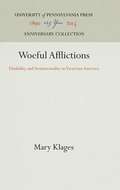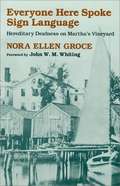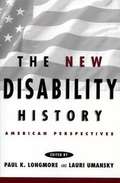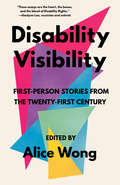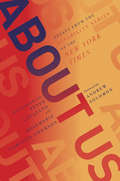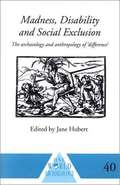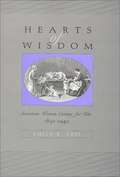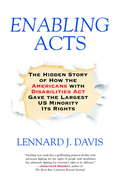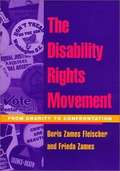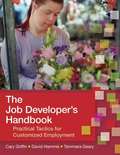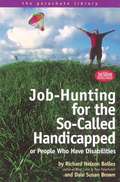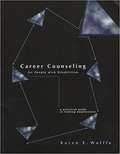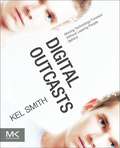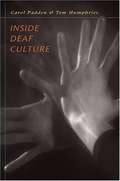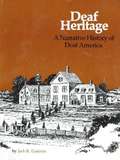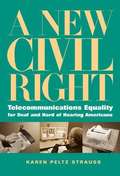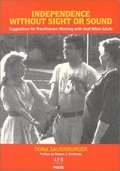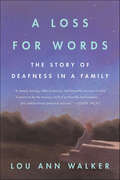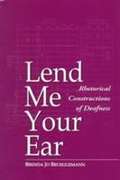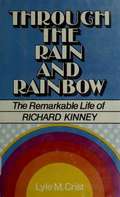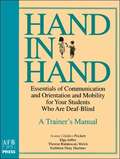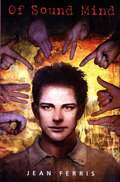Special Collections
Disability Collection
Description: Bookshare is pleased to offer a collection focused on the topic of disability and accessibility. #disability
- Table View
- List View
Woeful Afflictions
by Mary KlagesFrom Tiny Tim to Helen Keller, disabled people in the nineteenth century were portrayed in sentimental terms, as afflicted beings whose sufferings afforded able-bodied people opportunities to practice empathy and compassion. In all kinds of representations of disability, from popular fiction to the reports of institutions established for the education and rehabilitation of disabled people, the equation of disability and sentimentality served a variety of social functions, from ensuring the continued existence of a sympathetic sensibility in a hard-hearted, market-driven world, to asserting the selfhood and equality of disabled adults. Unique in its focus on blindness and its examination of the interplay between institutional discourse and popular literature, Woeful Afflictions offers a detailed historical analysis of the types of cultural work performed by sentimental representations of disability in public reports and lectures, exhibitions, novels, stories, poems, autobiographical writings, and popular media portrayals from the 1830s through the 1890s in the United States. Woeful Afflictions combines contemporary scholarship on sentimentalism with the most recent works on the cultural meanings of disability to argue that sentimentalism, with its emphasis on creating emotional identifications between texts and readers, both reinforces existing associations between disability and otherness and works to rewrite those associations in portraying disabled people, in their emotional capacities, as no different from the able-bodied. This book will interest anyone concerned with disability studies and the social construction of the body, with the history of education and of public institutional care in the United States, and with autobiographical writings.
Everyone Here Spoke Sign Language
by Nora E. GroceFrom the seventeenth century to the early years of the twentieth, the population of Martha's Vineyard manifested an extremely high rate of profound hereditary deafness.
In stark contrast to the experience of most deaf people in our own society, the Vineyarders who were born deaf were so thoroughly integrated into the daily life of the community that they were not seen-- and did not see themselves-- as handicapped or as a group apart. Deaf people were included in all aspects of life, such as town politics, jobs, church affairs, and social life.
How was this possible? On the Vineyard, hearing and deaf islanders alike grew up speaking sign language. This unique sociolinguistic adaptation meant that the usual barriers to communication between the hearing and the deaf, which so isolate many deaf people today, did not exist.
The New Disability History
by Paul K. Longmore and Lauri UmanskyIn a series of scholarly but highly readable essays, this book opens discussion on the role of disabled people in American history. It also examines how history has been affected by perceptions of disability. For example, one article looks at the ways disability has been used to strengthen prejudice against particular ethnic groups and to justify discrimination - "experts" have often claimed that one or another group of immigrants is genetically inferior and prone to mental retardation or physical frailty. One essay is based on the Civil War letters of a deaf man to his family. Another looks at the ways Helen Keller's Socialist beliefs were stifled by those around her.
Disability Visibility
by Alice Wong&“Disability rights activist Alice Wong brings tough conversations to the forefront of society with this anthology. It sheds light on the experience of life as an individual with disabilities, as told by none other than authors with these life experiences. It's an eye-opening collection that readers will revisit time and time again.&” —Chicago TribuneOne in five people in the United States lives with a disability. Some disabilities are visible, others less apparent—but all are underrepresented in media and popular culture. Activist Alice Wong brings together this urgent, galvanizing collection of contemporary essays by disabled people, just in time for the thirtieth anniversary of the Americans with Disabilities Act,From Harriet McBryde Johnson&’s account of her debate with Peter Singer over her own personhood to original pieces by authors like Keah Brown and Haben Girma; from blog posts, manifestos, and eulogies to Congressional testimonies, and beyond: this anthology gives a glimpse into the rich complexity of the disabled experience, highlighting the passions, talents, and everyday lives of this community. It invites readers to question their own understandings. It celebrates and documents disability culture in the now. It looks to the future and the past with hope and love.
About Us
by Rosemarie Garland-Thomson and Peter CatapanoBased on the pioneering New York Times series, About Us collects the personal essays and reflections that have transformed the national conversation around disability.
Boldly claiming a space in which people with disabilities can be seen and heard as they are—not as others perceive them—About Us captures the voices of a community that has for too long been stereotyped and misrepresented. Speaking not only to those with disabilities, but also to their families, coworkers and support networks, the authors in About Us offer intimate stories of how they navigate a world not built for them. Since its 2016 debut, the popular New York Times’ “Disability” column has transformed the national dialogue around disability. Now, echoing the refrain of the disability rights movement, “Nothing about us without us,” this landmark collection gathers the most powerful essays from the series that speak to the fullness of human experience—stories about first romance, childhood shame and isolation, segregation, professional ambition, child-bearing and parenting, aging and beyond.
Reflecting on the fraught conversations around disability—from the friend who says “I don’t think of you as disabled,” to the father who scolds his child with attention differences, “Stop it stop it stop it what is wrong with you?”—the stories here reveal the range of responses, and the variety of consequences, to being labeled as “disabled” by the broader public.
Here, a writer recounts her path through medical school as a wheelchair user—forging a unique bridge between patients with disabilities and their physicians. An acclaimed artist with spina bifida discusses her art practice as one that invites us to “stretch ourselves toward a world where all bodies are exquisite.” With these notes of triumph, these stories also offer honest portrayals of frustration over access to medical care, the burden of social stigma and the nearly constant need to self-advocate in the public realm.
In its final sections, About Us turns to the questions of love, family and joy to show how it is possible to revel in life as a person with disabilities. Subverting the pervasive belief that disability results in relentless suffering and isolation, a quadriplegic writer reveals how she rediscovered intimacy without touch, and a mother with a chronic illness shares what her condition has taught her young children. With a foreword by Andrew Solomon and introductory comments by co-editors Peter Catapano and Rosemarie Garland-Thomson, About Us is a landmark publication of the disability movement for readers of all backgrounds, forms and abilities.
Topics Include: Becoming Disabled • Mental Illness is not a Horror Show • Disability and the Right to Choose • Brain Injury and the Civil Right We Don’t Think • The Deaf Body in Public Space • The Everyday Anxiety of the Stutterer • I Use a Wheelchair. And Yes, I’m Your Doctor • A Symbol for “Nobody” That’s Really for Everybody • Flying While Blind • My $1,000 Anxiety Attack • A Girlfriend of My Own • The Three-Legged Dog Who Carried Me • Passing My Disability On to My Children • I Have Diabetes. Am I to Blame? • Learning to Sing Again • A Disabled Life is a Life Worth Living
Madness, Disability and Social Exclusion
by Jane HubertA unique work that brings together a broad range of specialist disciplines to create a new perspective on social and physical exclusion from society. Brings a much needed comparative approach to the subject of disability. Confinement, hermaphrodites, killing of disabled children, leprosy, deafness, and funerary rituals are explored.
Hearts of Wisdom
by Emily K. AbelDrawing upon a wealth of diaries, letters, and case records from hospitals and social service agencies, the author examines the shifting roles of caregivers between 1850 and 1940. In addition to the diaries and letters of literate white woman, she turns to slave narratives from the antebellum south and records from health-care agencies serving American Indians during the first part of the 20th century. Abel shows that women in the 19th century gained self-esteem and status through their knowledge of home remedies and nursing techniques. The medical profession gained strength with the discovery of microbes and the development of medications to treat specific diseases. During the 20th century professionals discredited women who provided health care at home. One chapter discusses mothers of children with epilepsy or mental retardation, who were pressured to place their children in institutions and to sever emotional ties with them. Another chapter explores the shift from American sign language to oralism in the education of deaf children, and the impact this had upon mothers. Abel concludes by looking briefly at the current trend to return more and more caregiving to the home.
Enabling Acts
by Lennard J. DavisThe first significant book on the history and impact of the ADA--the "eyes on the prize" moment for disability rights.
The Americans with Disabilities Act (ADA) is the widest-ranging and most comprehensive piece of civil rights legislation ever passed in the United States, and it has become the model for disability-based laws around the world. Yet the surprising story behind how the bill came to be is little known.
In this riveting account, acclaimed disability scholar Lennard J. Davis delivers the first behind-the-scenes and on-the-ground narrative of how a band of leftist Berkeley hippies managed to make an alliance with upper-crust, conservative Republicans to bring about a truly bipartisan bill.
Based on extensive interviews with all the major players involved including legislators and activists, Davis recreates the dramatic tension of a story that is anything but a dry account of bills and speeches. Rather, it's filled with one indefatigable character after another, culminating in explosive moments when the hidden army of the disability community stages scenes like the iconic "Capitol Crawl" or an event some describe as "deaf Selma," when students stormed Gallaudet University demanding a "Deaf President Now!"
From inside the offices of newly formed disability groups to secret breakfast meetings surreptitiously held outside the White House grounds, here we meet countless unsung characters, including political heavyweights and disability advocates on the front lines. "You want to fight?" an angered Ted Kennedy would shout in an upstairs room at the Capitol while negotiating the final details of the ADA. Congressman Tony Coelho, whose parents once thought him to be possessed by the devil because of his epilepsy, later became the bill's primary sponsor. There's Justin Dart, adorned in disability power buttons and his signature cowboy hat, who took to the road canvassing fifty states, and people like Patrisha Wright, also known as "The General," Arlene Myerson or "the brains," "architect" Bob Funk, and visionary Mary Lou Breslin, who left the hippie highlands of the West to pursue equal rights in the marble halls of DC.
Published for the twenty-fifth anniversary of the ADA, Enabling Acts promises to ignite readers in a discussion of disability rights by documenting this "eyes on the prize" moment for tens of millions of American citizens.
The Disability Rights Movement
by Doris Z. Fleischer and Freida ZamesBased on interviews with almost a hundred activists, this book provides a detailed history of the struggle for disability rights in the United States. It is a complex story of shifts in consciousness and shifts in policy, of changing focuses on particular disabilities such as blindness, deafness, polio, quadriplegia, psychiatric and developmental disabilities, chronic conditions (for example, cancer and heart disease), AIDS, and of activism and policymaking across disabilities.
Referring to the Americans with Disabilities Act as "every American's insurance policy," the authors recount the genesis of this civil rights approach to disability, from the almost forgotten disability activism of the 1930s, to the independent living movement of the 1970s, to the call for disability pride of the 1990s. Like other civil rights struggles, the disability rights movement took place in the streets and in the courts as activists fought for change in the schools, the workplace, and in the legal system. They continue to fight for effective access to the necessities of everyday life-to telephones, buses, planes, public buildings, restaurants, and toilets.
The history of disability rights mirrors the history of the country. Each World War sparked changes in disability policy and changes in medical technology as veterans without limbs and with other disabilities returned home. The empowerment of people with disabilities has become another chapter in the struggles over identity politics that began in the 1960s.
Today, with the expanding ability of people with disabilities to enter the workforce and a growing elderly population, issues like longterm care are becoming increasingly significant at a time when HMOs are trying to contain health care expenditures.
The Job Developer's Handbook
by Cary Griffin and David Hammis and Tammara GearyOne of the most practical employment books available, this forward-thinking guide walks employment specialists step by step through customized job development for people with disabilities, revealing the best ways to build a satisfying, meaningful job around a person's preferences, skills, and goals. Internationally known for their innovative, proactive job development strategies, the authors motivate readers to expand the way they think about employment opportunities and develop creative solutions.
Readers will get fresh, proven tips and ideas for every aspect of job development for youth and adults with significant support needs:
To make each part of job development easier, the book arms readers with practical content they can really use: easy-to-follow, step-by-step guidelines; checklists of critical questions to answer; success stories in both urban and rural settings; and sample scenarios, dialogues, and interview questions.
Equally useful to veteran professionals and those just starting out, this compelling guidebook breathes new life into the job development process and helps readers imagine a wider world of employment opportunities for people with disabilities.
Job-Hunting for the So-Called Handicapped (Second Edition)
by Richard Nelson Bolles and Dale S. BrownRichard Bolles' What Color is your Parachute? has helped millions of readers find their path in life, and now his creative approach to job-hunting is brought to bear on the specific challenges faced by job hunters with disabilities. In Job-Hunting for the So-Called HandicappedM/i>, Bolles and Dale Susan Brown guide readers through the often-frustrating, but ultimately rewarding process of securing independence in their lives and personal satisfaction in their careers. The authors begin by demystifying the intricacies of the ADA, describing in clear terms what the act does and does not guarantee disabled job hunters, and then move on to job-hunting strategies tailored specifically to people with disabilities.
Career Counseling for People with Disabilities
by Karen E. WolffeA text for use in courses in rehabilitation counseling, educational psychology, and special education, also useful for practicing counselors and educators. Section I introduces the field, types of clients, theories, and legislation. Section II details five key career counseling content areas, and Section III addresses disability- specific considerations. Section IV describes local, state, and national resources and lists helpful phone numbers. Includes chapter-opening vignettes and application activities, and five appendices of reproducible handouts to use with clients. Annotation copyrighted by Book News, Inc., Portland, OR
Digital Outcasts
by Kel SmithThe blind person who tries to make an online purchase. The young girl who cannot speak due to a cognitive disability. The man confined to his home due to permanent injury. The single mother with a long-term illness who struggles to feed her family. With one in seven people worldwide currently living with a disability, the term "outcast" covers numerous scenarios. Digital outcasts rely on technology for everyday services that many people take for granted. However, poorly designed products risk alienating this important (and growing) population. Through a "grass roots" approach to innovation, digital outcasts are gradually taking action to transform their lives and communities. This emerging trend provides exciting learning opportunities for all of us. Citing real-world case studies from healthcare to social science, this book examines the emerging legal and cultural impact of inclusive design. Gain a better understanding of how people with disabilities use technology Discover pitfalls and approaches to help you stay current in your UX practices Anticipate a future in which ambient benefit can be achieved for people of all abilities and backgrounds.
Inside Deaf Culture
by Tom Humphries and Carol PaddenIn this [account] of the changing life of a community, the authors of Deaf in America reveal historical events and forces that have shaped the ways that Deaf people define themselves today. Inside Deaf Culture relates Deaf people's search for a voice of their own, and their proud self-discovery and self description as a flourishing culture.
Padden and Humphries show how the nineteenth-century schools for the deaf, with their denigration of sign language and their insistence on oralist teaching, shaped the lives of Deaf people for generations to come. They describe how Deaf culture and art thrived in mid-twentieth-century Deaf clubs and Deaf theater, and they profile controversial contemporary technologies.
Most triumphant is the story of the survival of the rich and complex American Sign Language long misunderstood but finally recognized by a hearing world that could not conceive of language in a form other than speech. In a moving conclusion, the authors describe their own very different pathways into the Deaf culture, and reveal the confidence and the anxiety of the people of this tenuous community as it faces the future.
Deaf Heritage
by Jack GannonThis in-depth history of Deaf America begins with an overview of the early years. Each chapter then covers a decade of history, beginning with 1880. The text is supplemented by marvelous pictures, illustrations, vignettes and biographical profiles. "Subchapters" chronicle the multi-facited dimensions of Deaf culture by focusing on Deaf athletes and more. A complete Deaf Culture course!
A New Civil Right
by Karen Peltz StraussKaren Peltz Strauss reveals how the paternalism of the hearing-oriented telecommunications industries slowed support for accessible technology for the deaf and hard of hearing users.
Independence without Sight or Sound
by Dona SauerburgerSuggestions for working with deaf-blind adults by an expert on orientation and mobility.
The Deaf Musicians
by Pete Seeger and Paul Dubois JacobsLee is a piano man. Every night, he plays jazz for the crowd. It sounds something like this:
Plink-a-plink-BOMP-plink-plink.
Yimba-timba-TANG-ZANG-ZANG.
One night, Lee's bandmates notice something is off. Lee's music comes out like this:
Ronk. Phip. Tonk.
There's no way to hide it: Lee is losing his hearing. Then Lee discovers sign language. And soon after, he meets Max, who plays the sax. Together they form a new band-the Deaf Musicians. But who will listen to a deaf musician?
With The Deaf Musicians, Pete Seeger, Paul DuBois Jacobs, and three-time Coretta Scott King Honor winner R. Gregory Christie present an inspiring story of overcoming obstacles, set to a jazzy score.
OO-AH, BE-DOOP, BE-DOOP, OO-AH, YEAH!
Winner of the Schneider Family Book Award
For Hearing People Only
by Matthew S. Moore and Linda LevitanA question and answer book to those questions that the general public wants to know about Deafness, the Deaf culture, and what it is like to be Deaf in America.
A Loss for Words
by Lou Ann Walker“A personal journey of introspection by a young woman whose childhood was spent as parent to her deaf parents” (Kirkus Reviews).From the time she was a toddler, Lou Ann Walker acted as the ears and voice for her parents, who lost their hearing at a young age. As soon as she was old enough to speak, she assumed the responsibility of interpreter—confirming doctors’ appointments and managing her parents’ business transactions. While the Walkers’ family was warm and loving, outside the comfort of their home, they faced a world that misunderstood and often rejected them.In this deeply moving memoir, Walker offers us a glimpse of a different world, bringing with it a broader reflection on how parents grow alongside their children and how children learn to navigate the world through the eyes of their parents. In recounting her story, she encourages us to question the inequalities that shape our society, introduces us to the warm, supportive deaf community, and illuminates the creativity and kindness of humanity.Winner of the Christopher Award“A deeply moving, often humorous, and beautiful account of what it means to be the hearing child of profoundly deaf parents . . . I have rarely read anything on the subject more powerful or poignant than this extraordinary personal account by Lou Ann Walker.” — Oliver Sacks
Lend Me Your Ear
by Brenda Jo BrueggemannExplores, from the perspective of a rhetorician who is herself deaf, the social, cultural and educational impacts of deafness, both inside and outside of deaf culture.
Through the Rain and Rainbow
by Lyle M. CristRichard Kenny lost his sight at age seven. He spent his childhood adjusting to and overcoming blindness. He entered college but had to drop out in his second year when his hearing failed.
The next ten years contained motes of both great anguish and sweet victory as he adjusted to being totally deaf-blind. With perseverance, the support of family and friends, and the counsel of such leaders as Helen Keller and other workers for the deaf and blind, Kenny became the third deaf-blind person in history to earn a college degree. He married, became a father, traveled and wrote.
Hand in Hand
by Elga Joffee and Jeanne Glidden Prickett and Kathleen Mary Huebner and Therese Rafalowski WelchAn in-service training guide that presents structured information and guidelines for using the Hand In Hand materials with various audiences. Focusing on the needs of the trainer, this manual provides sample blueprints for individual workshops, as well as an overview of training, assessment, and evaluation. Also includes sample forms for conducting a pre-training needs assessment and post training evaluation.
Independent Living Without Sight and Hearing
by Richard KinneyThis is a wonderful resource for blind-deaf individuals and those who interact with them. It covers such topics as communication methods, independence at home, telephones, travel hints and much more.
Of Sound Mind
by Jean FerrisTired of interpreting for his deaf family and resentful of their reliance on him, high school senior Theo finds support and understanding from Ivy, a new student who also has a deaf parent.
